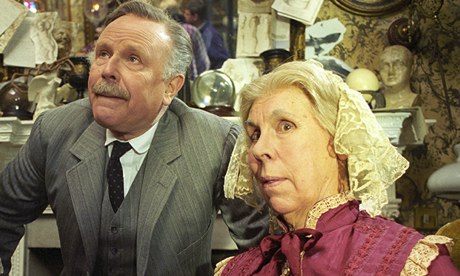
When Mel Brooks visited the film set of Up at the Villa (2000), in which his wife, Anne Bancroft, was starring, he proclaimed Barbara Hicks, who has died aged 89, the funniest woman he had ever met. This stalwart character actor, always lodged some way down any cast list as if to prove the truth of Stanislavski's dictum that there are no small parts, only small actors, was a fund of stories, many of them unprintable. And Hicks, though slight of build, with a long face and asymmetrical features, was certainly not a small actor.
As another admirer, Alan Bennett, once told her wistfully: "When you go, Barbara, there'll be a terrible hole in Spotlight." And so there is, for since first appearing on television in 1962 playing Miss Print, a comedy sidekick to Richard Hearne's popular Mr Pastry, she had cornered the market in battle-axe aunties, village gossips and critical serving staff in pinnies and housecoats.
Although she was associated with the early periods of both the English Stage Company at the Royal Court and the National Theatre at the Old Vic (and, later, on the South Bank), she was best known on television in Dickens and other classic serials, and in films as varied as Sailor, Beware! (1956) and Terry Gilliam's Brazil (1985), Merchant/Ivory's Howard's End (1992) and Philip Haas's Up at the Villa (2000), her last film, in which, as Lulu Good, she teamed up with old friends and shared experiences of late, fulfilling motherhood with Bancroft who, like her, had given birth to a son in her mid-40s.
Hicks was born in Wolverhampton, the youngest of three daughters of an iron and steel merchant, William "Copper" Hicks, and his wife, Hester Woolley, a formidable suffragist. She was educated at Adcote School for Girls in Shrewsbury, Shropshire, where she appeared as the Duke of Gloucester in Richard of Bordeaux and as Bottom in A Midsummer Night's Dream ("Barbara's Bottom was truly remarkable," said a school report), and served as a land girl in Wales during the war.
On graduating from the Webber Douglas school in London in 1947, she made her debut in Written for a Lady at the Royal Court in Liverpool, transferring to the Garrick in the West End. She worked in repertory theatres in New Brighton, near Liverpool, and at the King's, Hammersmith, and married a stage manager, Robert Loblowitz in 1951. She made an impression in 1957 in The Tunnel of Love starring Ian Carmichael at Her Majesty's and in Miss Pell is Missing with Yvonne Arnaud and Wilfrid Hyde-White at the Criterion in 1962.
In between, she made her mark at the Royal Court in Noël Coward's Look After Lulu, starring Vivien Leigh, Wole Soyinka's The Invention and Christopher Logue's The Lily White Boys, starring Albert Finney and directed by Lindsay Anderson, who became a firm friend.
She then joined the National at the Old Vic and appeared in George Farquhar's The Recruiting Officer (with Maggie Smith and Laurence Olivier), Pinero's Trelawney of the Wells, Congreve's Love for Love, and as Clara the maid in Coward's own famous 1964 revival of Hay Fever with Edith Evans, Smith, Robert Stephens and Derek Jacobi; she extended her range as a harsh, accusatory Goody Putnam (who has laid seven unbaptised babies in the earth) in Olivier's production of Arthur Miller's The Crucible.
Her life now changed completely. She had separated from Loblowitz after 10 years and in 1966 met Lieutenant-Colonel Peter Taylor, twice awarded the MC during the Italian campaign in the war, at a dinner party in Highgate, north London. Taylor, who was estranged from his wife, had retired and gone to live on the island of Elba, where Hicks now joined him. She opted out of her career for 10 years to raise her only child, Giles, and they married in 1970.
Her one job in this period was on Tony Richardson's movie The Charge of the Light Brigade (1968), in which she once again belied her status by playing a maid. The family returned to London in the mid-1970s and she returned to the National in 1977 to appear in Harley Granville Barker's The Madras House, directed by William Gaskill, with Paul Scofield in the leading role. She also joined the company of her local rep on the Essex and Suffolk borders, the Mercury at Colchester, where she appeared in Under Milk Wood and Alan Ayckbourn's Just Between Ourselves in 1978.
Ten years later, at the National, she was in Ayckbourn's company to play in his rewrite of the old farce Tons of Money and his own "state of the nation" masterpiece, A Small Family Business, in which, as Yvonne Doggett, she insinuated herself into the affections of the head of the failing firm, Ayres and Graces.
She made her last stage appearance at the National in 1995 in Anthony Page's blistering revival of Rodney Ackland's Absolute Hell (she had also appeared in the television version) with Judi Dench, another great friend.
Peter died in 2010, and she is survived by Giles, currently a member of the Royal Shakespeare Company.
• Barbara Purser Hicks, actor, born 12 August 1924; died 6 September 2013

